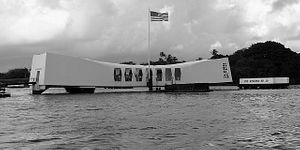Two days before the 75th anniversary of the attack on Pearl Harbor, Japanese Prime Minister Shinzo Abe announced plans to pay an historic visit to the Hawaiian port at the end of the month for a final summit with U.S. President Barack Obama in his last weeks as president.
Abe will be the first sitting Japanese leader to make the trip, just as Obama was the first sitting U.S. president to travel to Hiroshima.
In August, Abe’s wife, Akie, made what the Japan Times characterized as a “surprise visit” to Pearl Harbor. At the time, the Japanese administration denied rumors that the prime minister would soon pay a similar visit.
The surprise Japanese attack on Pearl Harbor — or more specifically, the U.S. naval fleet stationed there — on the morning of December 7, 1941, directly led to American entry into World War II. More than 2,400 servicemembers were killed in the Pearl Harbor attack, which also resulting in the sinking of four battleships, damaged a dozen other ships, and destroyed nearly 200 aircraft. 1,177 perished when the USS Arizona sank; it was the only ship not raised and a memorial floats above the wreckage, which still leaks oil into the harbor.
Less than four years later, the war would end after the United States used nuclear weapons on the Japanese cities of Hiroshima and Nagasaki. The two bombings killed more than 200,000 people, mostly civilians.
“We must never repeat the tragedy of the war,” Abe said in announcing his plans to visit Hawaii, according to the Associated Press. “At the same time, I would like to send a message of reconciliation between Japan and the U.S.”
Abe told reporters that he would spend two days in Hawaii — December 26 and 27 — including a visit to the naval base at Pearl Harbor, to pray for the war dead, and for a final meeting with Obama.
“This will be a visit to console the souls of the victims,” Abe said. “I would like to show to the world the resolve that horrors of war should never be repeated.”
While Obama’s visit to Hiroshima and his remarks centering on nonproliferation (and much deeper comment on the importance of history) were widely praised in Japan, they were met with greater skepticism in the United States. Critics argued that the visit to Hiroshima was little but another stop on Obama’s global apology tour.
It will be interesting to see how Abe’s visit is interpreted both in the United States and in Asia. For many in Asia — particularly in China and Korea — Abe’s much-anticipated statement commemorating the 70th anniversary of the end of World War II in August 2015 wasn’t exactly the “apology” for Tokyo’s wartime abuses that Beijing and Seoul wanted.
The White House confirmed that Obama will meet with Abe in a statement. “The two leaders’ visit will showcase the power of reconciliation that has turned former adversaries into the closest of allies, united by common interests and shared values.”
Abe’s visit to Pearl Harbor comes in the twilight of Obama’s presidency and amid a world leaning heavily toward populist politics and exaggerated rhetoric. Abe was the first world leader to meet with President-Elect Trump.
The 90-minute meeting on November 17, was held in Trump Tower in New York City and neither side provided many details about the discussions. Abe emerged from the meeting saying “Alliances cannot function without trust. I am now confident that President-elect Trump is a trustworthy leader.”
A diplomatic source told the Japan Times that the Obama administration expressed opposition to the Trump-Abe meeting, an allegation Abe has denied.
“There are even reports that my meeting with the president-elect made my relationship with President Obama rocky. But that is sorely mistaken. And I guarantee that we will learn the truth sometime soon,” Abe said Monday, during a meeting of an Upper House committee on the Trans-Pacific Partnership agreement. Hours later, Abe announced the Pearl Harbor trip in a televised news conference.

































